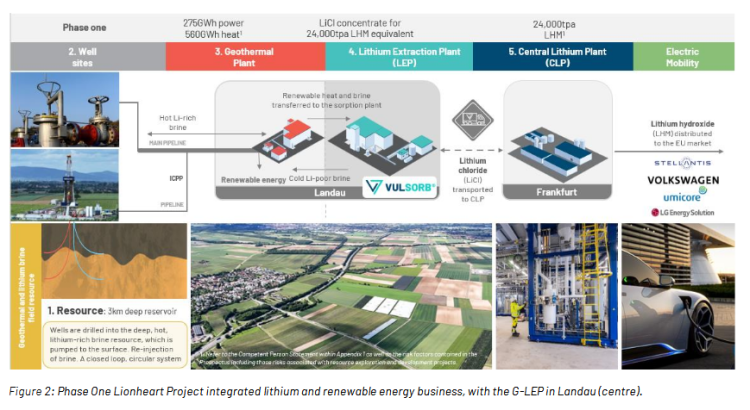Vulcan Energy (Vulcan, ASX: VUL, FSE: VUL, the Company) is pleased to announce it has signed a major contract with a consortium between Turboden and ROM Technik to develop, procure and construct the commercial geothermal power plant near Landau Germany, as part of the Phase One Lionheart Project (the Project).
Lionheart will have the capacity to produce 275 GWh of power, and 24,000 tonnes of lithium hydroxide, enough for ca. 500,000 electric vehicles, per annum.1
Key points
- The contract includes the full scope of services required for the Engineering, Procurement and Construction (EPC) of Vulcan's new Phase One geothermal power plant and is on a fixed lump-sum turnkey basis with a value of ~ 110 million2
- The geothermal power plant will utilise Organic Rankine Cycle (ORC) technology in generating renewable power from Vulcan's geothermal brine. The renewable power is produced as a co- product, alongside lithium, which is also produced from the same brine source, at Vulcan's upstream Geothermal and Lithium Extraction Plant (G-LEP)
- Turboden is an Italian firm and part of Mitsubishi Heavy Industry. Turboden specialises in the design, manufacture and maintenance of ORC systems both in Germany and globally. ORC systems produce baseload renewable energy, ensuring stability to the grid
- ROM Technik specialises in technical building equipment and installation services and will be responsible for co-ordinating the respective contractors on the construction of the geothermal power plant
- The signing of the contract is a condition precedent to financing, which the Company is targeting to finalise, together with additional project and financing agreements, in H2 2025
- The execution of this contract follows the signing of a supply contract with NORAM Electrolysis Systems, in early September 2025, to be the exclusive lithium electrolysis technology supplier for the downstream part of Project
- It also follows recent approval by the City of Landau Council for the Company to purchase the land for its G-LEP. The approval is a key requirement in the construction of the plant, with the Company having already received building permits for the 30MW geothermal renewable energy plant and electrical substation that form the G-LEP.
1 Please refer to the risk factors contained in the 18 December 2024 (Prospectus) and Appendix 4 of the Equity Raise Presentation dated 11 December 2024 regarding the risks associated with resource exploration and development projects. Based on the Phase One production target capacity of 24ktpa from the Bridging Engineering Study (BES) Announcement 16 November 2023 and Vulcan internal estimated average EV battery size and chemistry in Europe. Please also refer to the Competent Person Statement.
2 Subject to indexation adjustments and negotiation should it not become effective by end 2025 . All material payments are contingent on Vulcan finalising its financing package, which is targeted for H2 2025.
Vulcan Energy's Managing Director and CEO, Cris Moreno, commented: "The geothermal power plant is a key component of our Phase One operation.
"Securing the services of both Turboden and ROM Technik, who are both leaders in their respective fields, will underpin the construction of the geothermal power plant, and we are fully confident in their ability to execute having delivered similar type projects in Germany and globally.
"This is yet another milestone in our aim to deliver a local, low -cost source of sustainable lithium for the European battery supply chain, with a co-product of renewable energy production."
"We look forward to working with both service providers in ultimately contributing to the Landau region's supply of climate-neutral energy."










